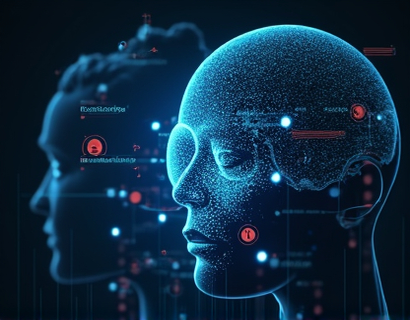Unlocking Next-Gen Engagement: Mastering Digital Transformation with Crypto and AI Synergy
The digital landscape is undergoing a profound transformation, driven by the convergence of cryptocurrency and artificial intelligence (AI). This synergy offers unprecedented opportunities for tech-savvy professionals to enhance user interaction and drive growth. By understanding and leveraging the potential of both technologies, businesses can unlock transformative digital engagement, fostering innovation and efficiency in an increasingly competitive environment.
Cryptocurrency, since its inception, has revolutionized the way we think about value, transactions, and decentralization. It has paved the way for a new economic paradigm, one that is more inclusive, secure, and transparent. On the other hand, AI has been transforming industries by enabling machines to learn, adapt, and perform tasks that traditionally required human intervention. When these two powerful forces are combined, the potential for innovation and engagement becomes immense.
Understanding the Intersection of Crypto and AI
The intersection of cryptocurrency and AI is a fertile ground for technological advancements. Cryptocurrencies, with their blockchain technology, provide a secure and decentralized platform for AI applications to operate. This synergy allows for the creation of smart contracts that can automate and enforce agreements without the need for intermediaries, reducing costs and increasing efficiency.
AI algorithms can analyze vast amounts of data on the blockchain, providing insights and predictions that can be used to optimize various processes. For instance, in the realm of finance, AI-driven trading bots can operate on decentralized exchanges, executing trades based on complex algorithms and market data stored on the blockchain. This not only enhances the speed and accuracy of trading but also ensures transparency and security.
Enhancing User Interaction through Crypto and AI
To truly harness the power of crypto and AI, businesses must focus on enhancing user interaction. This involves creating seamless, intuitive, and secure experiences that leverage the strengths of both technologies. One key area is personalized user experiences. AI can analyze user behavior and preferences, providing tailored recommendations and content. When integrated with cryptocurrency, this can be taken a step further by allowing users to earn and use tokens based on their engagement and contributions.
For example, a digital platform can implement a token economy where users earn tokens for participating in discussions, sharing content, or completing tasks. These tokens can then be used to access premium features or goods within the platform, creating a self-sustaining ecosystem. The use of AI to personalize the token distribution and reward system ensures that users are motivated and engaged, leading to higher retention rates and increased user loyalty.
Driving Growth with Crypto and AI
Growth in the digital landscape is no longer just about acquiring new users; it's about retaining them and fostering a community that actively contributes to the platform's success. Crypto and AI can play a pivotal role in achieving this. By implementing blockchain-based loyalty programs, businesses can create a transparent and fair system where users are rewarded for their contributions. AI can optimize these programs by analyzing user behavior and adjusting rewards in real-time to maximize engagement.
Another strategy is to leverage NFTs (Non-Fungible Tokens) to create unique digital assets that users can own and trade. These NFTs can represent exclusive content, access to events, or even virtual goods. AI can be used to generate and manage these assets, ensuring they are unique and valuable. This not only attracts users interested in the crypto space but also creates new revenue streams for the business.
Building Trust and Security
Trust and security are paramount in the crypto and AI ecosystem. Users must feel confident that their data and transactions are secure. Blockchain technology inherently provides a high level of security through its decentralized and immutable nature. AI can further enhance security by detecting and mitigating potential threats in real-time. For instance, machine learning algorithms can monitor network activity for unusual patterns that may indicate a security breach, allowing for swift action to be taken.
Transparency is another critical aspect. Blockchain's transparent ledger allows users to verify transactions and processes, building trust. AI can facilitate this by providing clear and understandable insights into how data is used and how decisions are made. This combination of transparency and security can significantly enhance user trust, leading to greater adoption and loyalty.
Innovative Business Models
The synergy of crypto and AI opens up new business models that can drive growth and innovation. One such model is the decentralized autonomous organization (DAO), where decision-making is managed by smart contracts on the blockchain. AI can enhance DAOs by providing data-driven insights and automating complex decision-making processes. This ensures that the organization operates efficiently and in the best interest of its members.
Another innovative model is the use of AI-powered predictive analytics on the blockchain. Businesses can offer predictive insights to other organizations, helping them make informed decisions. These insights can be sold as tokens, creating a new market for data-driven services. AI ensures that the insights are accurate and relevant, while the blockchain ensures secure and transparent transactions.
Case Studies and Real-World Applications
Several companies are already leveraging the synergy of crypto and AI to drive engagement and growth. For instance, a gaming platform has implemented a token economy where players earn tokens for in-game achievements. These tokens can be used to purchase virtual items or traded on a decentralized exchange. AI is used to personalize the gaming experience, adapting difficulty levels and content based on player behavior. This has led to increased user engagement and a vibrant community of token holders.
In the healthcare sector, a decentralized health record system uses blockchain to store patient data securely, while AI algorithms analyze this data to provide personalized health recommendations. Patients can control access to their data and earn tokens for sharing it with healthcare providers, creating a mutually beneficial ecosystem. This not only enhances patient engagement but also improves the quality of care.
Challenges and Considerations
While the potential of crypto and AI is vast, there are challenges that businesses must navigate. Regulatory uncertainty is a significant hurdle, as the crypto space is still evolving and regulations vary by region. Companies must stay informed and compliant with local laws to avoid legal issues. Additionally, the technical complexity of integrating blockchain and AI requires a skilled workforce and significant investment.
Another consideration is the environmental impact of blockchain, particularly proof-of-work (PoW) systems, which consume substantial energy. Businesses should explore more sustainable blockchain solutions, such as proof-of-stake (PoS) or other consensus mechanisms, to minimize their environmental footprint.
Future Trends and Opportunities
The future of crypto and AI is bright, with numerous trends and opportunities on the horizon. One emerging trend is the integration of AI with other blockchain technologies, such as quantum computing, which promises to significantly enhance computational power and efficiency. This could lead to more advanced AI models and faster blockchain transactions.
Another opportunity lies in the development of cross-chain solutions, allowing different blockchain networks to interact seamlessly. AI can optimize these interactions, ensuring smooth and secure data transfer and transaction processing. This will foster a more interconnected and efficient digital ecosystem.
Furthermore, the rise of Web3, a decentralized internet powered by blockchain, AI, and other emerging technologies, presents a vast landscape for innovation. Web3 applications will leverage these technologies to create more user-centric, secure, and transparent online experiences. Businesses that embrace Web3 principles will be well-positioned to lead the next wave of digital transformation.
In conclusion, the synergy of cryptocurrency and AI offers transformative potential for digital engagement and growth. By understanding and leveraging this synergy, tech-savvy professionals can drive innovation, enhance user interaction, and build sustainable business models. The journey ahead is exciting, with numerous opportunities to shape the future of the digital landscape.









































